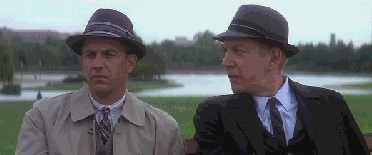The JFK 100
"The Organizing Principle of Any Society Is for War"

Jim Garrison (Kevin Costner) and mystery man "X" (Donald Sutherland)

Jim Garrison (Kevin Costner) and mystery man "X" (Donald Sutherland)
"Sometimes I think the organizing principle of any society is for war," the Pentagon insider says. "The authority of the state over its people resides in its war powers."(1)
As with much of X's monologue, Oliver Stone got this little gem from L. Fletcher Prouty. The filmmaker discussed it in the introduction he penned for Prouty's book, JFK: The CIA, Vietnam, and the Plot to Assassinate John F. Kennedy:
The key question of our time [Stone writes], as posed in Colonel Prouty's book, comes from the fabled Report from Iron Mountain on the Possibility and Desirability of Peace by Leonard Lewin (based on a study commissioned by Defense Secretary Robert McNamara in August 1963 to justify the big, planned changes in defense spending contemplated by Kennedy):Indeed, Prouty refers to this "fabled" report numerous times in his book, praising it highly and quoting from it liberally. He notes that it originated with "the Special Study Group," "an organization," Prouty writes, "whose existence was so highly classified that there is no record, to this day, of who the men in the group were or with what sectors of the government or private life they were connected."(3)
The organizing principle of any society is for war. The basic authority of a modern state over its people resides in its war powers. . . . War readiness accounts for approximately a tenth of the output of the world's total economy.(2)
Prouty elaborated upon the subject in a broadcast for the December 14, 1989, edition of Liberty Lobby's Radio Free America. The study was so secret that the group of "power brokers" who conducted it met, he said, "in an underground storage and security area" in New York's Hudson Valley called "Iron Mountain." Its views, according to Prouty, reflect those of the "high cabal" that is really "calling the shots."(4)
Lt. Col. Prouty (Ret.) has even managed to obtain an exclusive interview with a "purported member of the Iron Mountain Special Study Group," who told Prouty he "believes that the group's mission was delineated by McNamara, William Bundy, and Dean Rusk."(5)
The punchline, of course, is that The Report from Iron Mountain was revealed three decades ago as a hoax; it was written by political satirist Leonard Lewin. Upon its publication by Dial Press, Lewin's friend Victor Navasky, former editor of the humor magazine Monocle, persuaded Dial publisher Richard Baron to list the title in their catalog as non-fiction.(6)
New York Times reporter John Leo checked into the story, and received a carefully worded denial from the State Department ("To our knowledge no such special group ever existed") and a no-comment from LBJ's White House (for all the White House knew, Victor Navasky observes, maybe JFK had commissioned such a study). The result was a front-page John Leo article in the Times, with a headline reading, "Some see book as hoax/Others take it seriously." Subsequently, Lewin and Navasky fessed up.(7)
The fun wasn't over yet, of course.
In a weird coda [Victor Navasky writes], Lewin discovered in the mid-1980s that the ultraright Liberty Lobby [with which L. Fletcher Prouty enjoyed a lengthy professional association] and others believing that the report was a government document, had disseminated thousands of copies without bothering to request permission and some of these copies were being sold through Liberty Lobby's hate-filled newspaper, The Spotlight. He sued and the case was settled out of court, resulting in the withdrawal of thousands of copies of the bootleg edition, which now reside in Lewin's living room. But well-worn copies continues to circulate along with a six-hour video based on the book.Too bad nobody told Oliver Stone.One might think that the hoax, having been confessed, proclaimed, and even adjudicated, would, after twenty-five years, have been laid to rest. But no, like a radioactive substance, it seemed to have a half-life of its own.
You may wish to see . . .
The JFK 100: The Mystery Man, "X"
NOTES:1. Oliver Stone and Zachary Sklar, JFK: The Book of the Film (New York: Applause, 1992), p. 112. All quotations are from the shooting script and may vary slightly from the finished motion picture.
2. L. Fletcher Prouty, JFK: The CIA, Vietnam, and the Plot to Assassinate John F. Kennedy (New York: Birch Lane, 1992), pp. x-xi.
3. L. Fletcher Prouty, JFK: The CIA, Vietnam, and the Plot to Assassinate John F. Kennedy (New York: Birch Lane, 1992), p. 5.
4. Edward Jay Epstein, "JFK: Oliver Stone's Fictional Reality," The Atlantic, 1993.
5. L. Fletcher Prouty, JFK: The CIA, Vietnam, and the Plot to Assassinate John F. Kennedy (New York: Birch Lane, 1992), p. 150.
6. Leonard Lewin, Report from Iron Mountain (New York: Free Press, 1996), pp. ix-xi.
7. Leonard Lewin, Report from Iron Mountain (New York: Free Press, 1996), pp. xi-xii.
The JFK 100: The Mystery Man, "X"